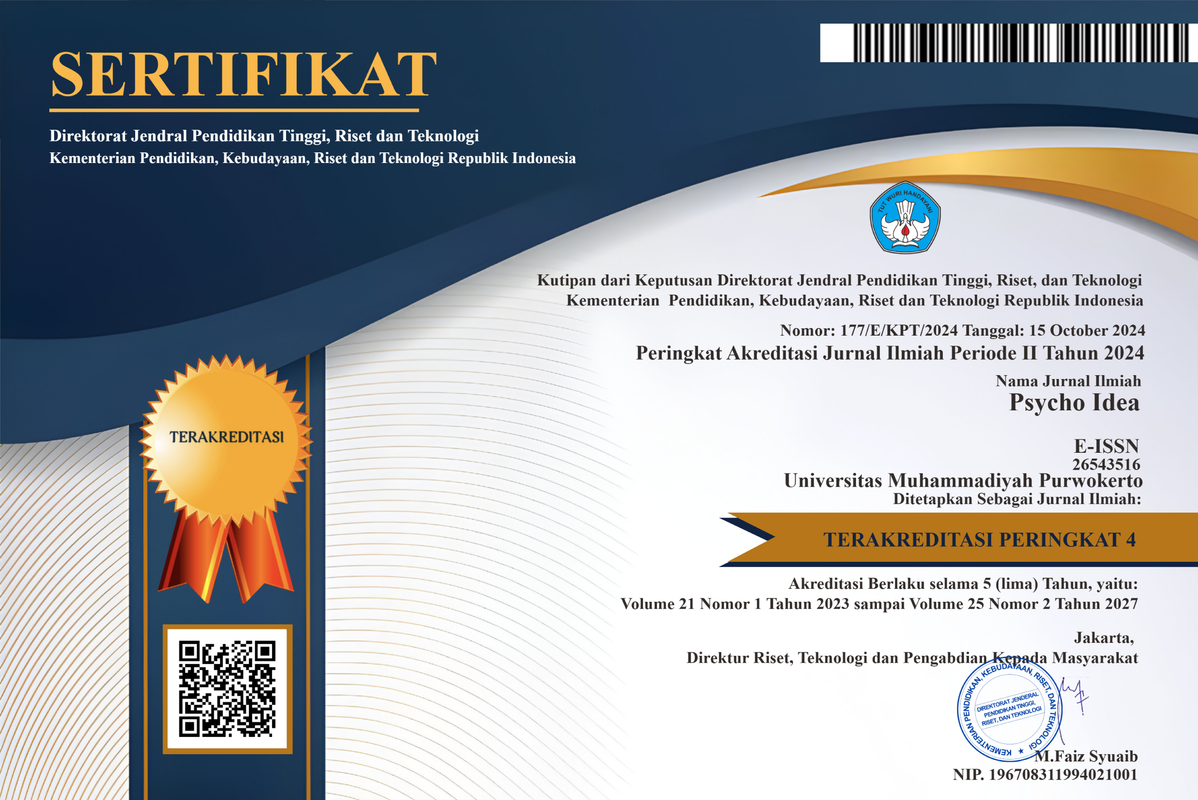EFEKTIVITAS PELATIHAN KETERAMPILAN SOSIAL PADA REMAJA DENGAN GANGGUAN KECEMASAN SOSIAL
DOI:
https://doi.org/10.30595/psychoidea.v8i1.195Abstract
Tujuan penelitian ini adalah untuk mengetahui efektivitas Pelatihan Keterampilan Sosial pada remaja dengan Gangguan Kecemasan Sosial. Subjek penelitian adalah siswa-siswi kelas VII SMPN 1 Kalasan (4 laki-laki, dan 12 perempuan), dengan gejala Gangguan Kecemasan Sosial. Subjek dibagi ke dalam kelompok eksperimen dan kelompok kontrol / waiting list. Skala Kecemasan Sosial Remaja (SKSR) digunakan dalam pengukuran pra perlakuan, segera sesudah perlakuan, dan 6 bulan setelah perlakuan. Hasil penelitian ini menunjukkan bahwa skor SKSR pada kelompok eksperimen mengalami penurunan yang signifikan segera setelah diberikan pelatihan (0,011 ; p < 0,05). Skor SKSR pada kelompok kontrol juga mengalami penurunan, namun tidak signifikan (0,160 ; p < 0,05). Penurunan skor SKSR pada subjek penelitian bertahan secara signifikan hingga periode 6 bulan pasca pelatihan. Jadi, Pelatihan Keterampilan Sosial efektif untuk menurunkan Gangguan Kecemasan Sosial pada Remaja, dan efektivitasnya dapat bertahan hingga periode 6 bulan sesudah pelatihan. Kata Kunci : Kecemasan Sosial, Kecemasan, Pelatihan Keterampilan Sosial, RemajaReferences
Albano, A.M. (1998). Social phobia in children and adolescents : Current treatment approaches. Cognitive and Behavioral Practice. 2, 271-298
American Psychiatric Association. (1994). Diagnostic and statistical manual of mental disorder, 4th edition. Washington D.C : American Psychiatric Press
Blanco. C, Scheiner, F.R. (1997). Current and new approaches to social phobia. Medscape Psychiatry and Mental Health eJournal. 2,2. http://www.medscape.com/viewarticle/431382. 02 Mei 2006.
Cook T.D., Campbell, D.T. (1979). Quasi eksperimentation : Design and analysis issues for field setting. Evanston : Houghton Mifflin Company.
Gravetter, F.J, & Forzano, L.B. (2006). Research methods for the behavioral science. New York : Thomson Wadsworth.
Harb H.M, Heimberg, R.G. (2000). An overview of cognitive behavioral group therapy for social phobia. www.guilford.com/excerpts/heimberg2.pdf. 27 April 2006.
Korchin, S.J. (1976). Modern Clinical Psychology. Principles of Intervention in the Clinic and Community. New York : Basic Book, Inc., Publishers
Kelly, J.A. (1983). Social skills training, a practical guide for interventions. New York : Springer Publishing Company.
La Greca, A.M, Lopez, N. (1998). Social anxiety among adolescents : Linkages with peer relation and friendships. Journal of Abnormal Child Psychology. 26,83-94
Ramdhani, N. (1992). Pelatihan keterampilan sosial untuk penderita kesulitan bergaul. Laporan Penelitian (Tidak Diterbitkan). Fakultas Psikologi Universitas Gadjah Mada Yogyakarta
Richards, T.A. (2002). What is comperehensive cognitive behavioral therapy : How is CBT used to overcome social anxiety disorder. http://ww.SAI.com. 27 April 2006
Siegel, S. (1994). Statistik non parametrik untuk ilmu-ilmu sosial. Jakarta : PT. Gramedia
Downloads
Published
Issue
Section
License
Authors published in this journal agree to the following terms:
- The copyright of each article is retained by the author (s) without restrictions
- The journal allows the author(s) to retain publishing rights without restrictions
- The author grants the journal the first publication rights with the work simultaneously licensed under the Creative Commons Attribution License, allowing others to share the work with an acknowledgment of authorship and the initial publication in this journal.
- Authors may enter into separate additional contractual agreements for the non-exclusive distribution of published journal versions of the work (for example, posting them to institutional repositories or publishing them in a book), with acknowledgment of their initial publication in this journal
- Authors are permitted and encouraged to post their work online (For example in the Institutional Repository or on their website) before and during the submission process, as this can lead to productive exchanges, as well as earlier and larger citations of published work
- Articles and all related material published are distributed under a Creative Commons Attribution-4.0 International Public License (CC - BY 4.0).
License
Psycho Idea is licensed under a Creative Commons Attribution- 4.0 International Public License (CC - BY 4.0).
You are free to :
Share — copy and redistribute the material in any medium or format
Adapt — remix, transform, and build upon the material for any purpose, even commercially











